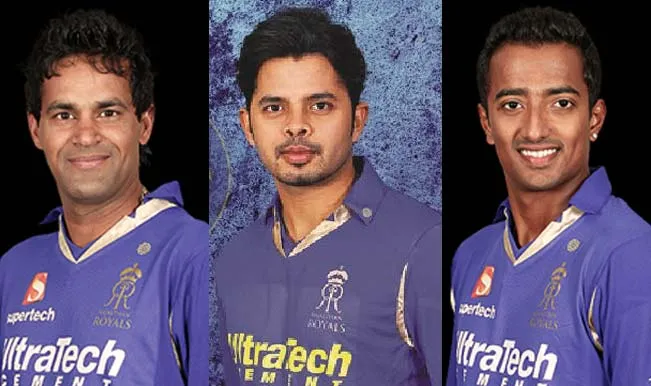Biggest Match Fixing Scandals In Cricket
The beautiful game of Cricket has had its share of dark days over the years. Match-fixing is a black spot on the sport and has tarnished its reputation extensively. The protagonists must always be brought to justice, upholding the integrity.

The tough sport of Cricket has a rich and glorious history, and its legacy has become eternal ever since it was first played scores of years ago. The game and its stakeholders have witnessed several memorable moments over time. This tryst with destiny has aided the British game to come of age and solidify its heritage towards greatness. Fans have grown and stayed loyal courtesy of the positive incidents and the love for their idols, whom they look up to. The players have signified more than just a living being playing the game. They have been ambassadors for the sport and are responsible for its goodwill, brand identity, and authentic image.
However, richness comes with a price, and just like a coin has two sides, Cricket has dealt with severe moments as well. The second most loved sport in the world has had its share of black days, too. Those distasteful and shocking episodes have hampered and created a massive hole in the glittering history of the game. They are oppositely but equally remembered as the finest moments, and instead threaten the ethics to a great extent. These ignominiously dark sides are a disgrace, and their anchors deserve justice to save the health of the game.
See Also: Cricketers Who Made History with Guinness World Records
Here is a look at some of the biggest and most significant match-fixing incidents that shook the cricketing world, their history, protagonists, and deep-scale consequences.
Cronje and Azharuddin: The Match-Fixing Scandal of 2000

The most infamous of all cricket match-fixing scandals dates back to 2000. The Delhi Police charged Hansie Cronje, the then South African skipper, with fixing his side's One Day International (ODI) matches against India in March of that year. Cronje initially denied his wrongdoing, but as evidence accumulated, all the allegations proved true, and he eventually confessed to his part. The other Proteas teammates testified that they had received lucrative offers from their captain to throw the match, bow down to the bookies, and get involved in fixing the game.
Hansie, later, accused Mohammad Azharuddin of introducing the former to the associated bookmaker, and further investigations found the former Indian cricketer guilty as well. Both were banned for life by the ICC and their respective national boards. This uncovered a chain of players involved. Herschelle Gibbs, a prominent former South African player, received a six-month ban for his part in this scandal. Ajay Sharma, a former Indian domestic cricketer and Delhi player, was also banned for life as he was named in the Central Bureau of Investigation (CBI) report alongside Azharuddin for having links with bookies and manipulating matches. In September 2014, his ban was lifted by the Delhi district court. Cronje died in a plane crash in 2002, and ever since his death, suspicions of malicious acts and links with the fixing saga loom large over his demise to date.
Pakistan's Spot-Fixing in the UK, 2010

In 2010, Pakistan's cricket team toured England for a test series. During the Lord's match, three players from the touring side, namely Salman Butt, Mohammad Asif and Mohammad Amir, were accused of receiving bribes from a bookmaker, and then organising and deliberately performing feats to affect the moments in the match. This included intentional no-balls to hamper the outcome of the game, and the act was categorised as 'spot-fixing'.
The International Cricket Council (ICC) and the British Crown Court found them guilty and, as punishment, sentenced the trio to jail terms of variable lengths in the UK. The Pakistani players' on-field actions were condemned by everyone from all quarters, and this entire saga took the sporting world by storm. It called for immediate measures to uphold the integrity of the sport.
IPL 2013 Spot-Fixing

During the Indian Premier League (IPL) 2013, a major scandal erupted when the Delhi Police arrested Sreesanth, Ajit Chandila, and Ankeet Chavan of the Rajasthan Royals (RR) on charges of spot-fixing. They were believed to be involved in a syndicate having a history of organising such criminal acts in sports and consequently altering several matches in the IPL. The Board of Control for Cricket in India (BCCI), on its part, handed the trio life bans and ensured free and fair trials to confirm justice for everyone involved.
This incident sent ripple waves across the Indian Cricketing circuit and raised serious questions. Fans subsequently lost faith in the tournament, and the game was frowned upon by many. The Rajasthan franchise was banned for a couple of seasons in 2016 and 2017, following this ominous run of events. IPL cricket regained its credibility gradually over time. A few years back, the Court gave the culprits a clean chit, and that helped them to resume professional cricket.
Chennai Super Kings (CSK) Fixing Scandal 2013

The MS Dhoni-led Chennai Super Kings (CSK) were banned from competing in the IPL for two seasons - 2016 and 2017. Gurunath Meiyappan, one of their high-profile team officials, was involved in betting and leaking team information during IPL 2013. He was also the son-in-law of the then BCCI president N. Srinivasan. This scandal was the major stepping stone towards institutional reforms in cricket. Various committees were set up and designated to safeguard the integrity of the sport. The Lodha Committee was the primary one among all. An Anti-Corruption Security Unit (ACSU) in cricket was also set up by the BCCI to remove any cases of graft from the game.
Marlon Samuels' Match-Fixing Case 2007

Ahead of an ODI series involving the teams of India and the West Indies in 2007, the Caribbean batter was accused of several dealings with the bookmakers. Recordings of his telephonic conversations with the bookie before the Nagpur ODI were found, and he was charged with sharing the details of the match. This was confirmed after an investigation initiated by the West Indies Cricket Board. Allegations of bribery and match-fixing were levelled against him, and Marlon was handed a two-year ban by the ICC.
John - 'The Bookmaker'

In 1998, Australian cricketers Steve Waugh and Shane Warne went through a turbulent phase when their names got embroiled in match-fixing. It was discovered that the duo had accepted money from an Indian bookmaker named John to share the pitch and weather information during the 1994-95 season. The news was initially kept reserved within the Australian Cricket fraternity, and when it eventually broke out during the 1998 Ashes series, the players and the Board were reprimanded for their heinous actions. However, the controversy didn't escalate much. The ICC took no further action, and the players were let go after just being fined by Cricket Australia (CA).
Manoj Prabhakar, 1999, and Ajay Jadeja, 2000

Manoj Prabhakar, a former all-rounder, was banned in 1999 after he showed up at an event organised by the Tehelka News Group. It was on exposing match-fixing events in Cricket. He, however, ended up getting accused himself and banned from playing for the national side by the BCCI. A decade later, in 2011, he was also dismissed from his role as the coach of the Delhi domestic cricket team after he publicly criticised and pulled up the players and selectors.
Also, in the year 2000, Ajay Jadeja, a former stylish Indian all-rounder, was banned by the BCCI for five years for his involvement in match-fixing. The Delhi High Court, though, lifted his ban in 2003, but his cricketing career could never revive. He instead took up commentary and is currently a one.
Tags:







